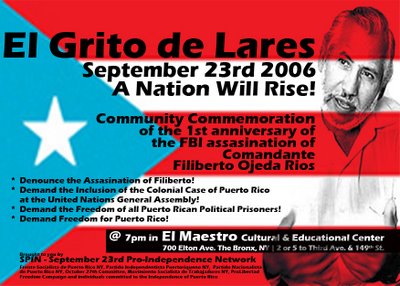Piñones: Prohibited and Prohibitive
 By Sarah J. Peisch, speisch@caribe.net Translated by NYC Steering Committee, foronyc@gmail.com Note: Piñones is a thriving 300 year-old community founded by runaway slaves on the shores of Loíza, Puerto Rico. Despite being located within an area classified by the federal government as a “coastal barrier zone”, the local government is supporting private developers who seek to build hotels and luxury condos along the coast, threatening the livelihood, culture, and safety of the existing community. On September 17, 2006, community organizations, supported by trade unions, environmental groups, and other parties and organizations, led a successful demonstration of over 1,000 people at the Governor’s residence (see photos at http://pr.indymedia.org/news/2006/09/18413.php). Once again, the possible transformation of Piñones is causing commotion. This community endowed with beautiful beaches and Afro-Caribbean culture is facing, once again, the densification of the area by high-priced residential and tourist complexes. There are, however, important differences this time around in the polemic surrounding the development of the project known as “Costa Serena”. In 2006, we have a better understanding of the danger posed to human life and coastal communities coast by hurricanes and storms. August 29 marks the first anniversary of Hurricane Katrina, a natural disaster that was exacerbated by poor planning and faulty decision-making by the government. No less than 2,000 people died because of Katrina, and thousands of families have never been able to return to New Orleans and other cities and towns along the coastline of Louisiana, Alabama, and Mississipi. Governments have the responsibility to carry out effective planning to minimize the loss of lives as a cause of natural disasters. In 1983, the US Congress approved legislation to reduce threats to public safety and protect coastal natural resources. This law seeks to provide disincentives to construction and urbanization in coastal areas, and designates some of the zones with high risk of flooding as coastal barriers. Coastal areas that meet the criteria of the Coastal Barrier System are those where valuable ecological resources coincide with the threat posed to the population by floods caused by ocean tides, swelling rivers, or both. The law establishes that new buildings in these zones don’t qualify for federal flood insurance provided by the National Flood Insurance Program (NFIP), which provides aid for those affected by floods. Not only that, the law prohibits the use of federal funds for the building of roads and infrastructure within coastal barrier zones. In 1990, the Puerto Rican government’s Planning Board presented maps which identify coastal barriers in Puerto Rico, where federal funding was eliminated. The Costa Serena project would be located precisely within the coastal barrier of Piñones. It is important to stress that restrictions affecting these zones weren’t created with the purpose of penalizing existing communities within the barrier zone, nor do they seek to remove them from the federal insurance program. The restrictions only apply to new constructions. In fact, most of the populated sectors of Piñones are completely outside the coastal barrier zone. In July of 2005, Puerto Rico’s Secretary of Natural and Environmental Resources noted the danger related to the Costa Serena project, stating that the area “is isolated by the normal swelling of the Loíza River. Locating a residential nucleus within it will have the effect of making the State invest in the evacuation of residents every time there is a flood event, which also entails risking the lives of the rescue workers charged with the task of aiding them.” Facing these risks and limitations, the developer has replied he will purchase private insurance. However, the cost of private flood insurance in risk areas is prohibitive for current residents. The insurance industry recently reported increases of as much as 40% in policy costs as a result of the experience of Hurricane Katrina. Down payments for private insurance can be up to ten times more expensive than NFIP insurance. Likewise, banks are hesitant or unable to make loans for projects located within the coastal barrier. Wealthy people buy private insurance to build on forbidden coastal zones, but they rely on public services in case of an emergency. The densification of the Piñones coast implies a public responsibility, and the people will foot the bill. The way in which evacuation and emergency routes on which existing communities depend would be overburdened is also worrying. We can’t allow Piñones to endure an ordeal as tragic as the one that befell New Orleans and the rest of the Gulf Coast during Hurricane Katrina: aid for the poor arrived too late. Knowing the risks to human life and the high costs of reconstruction caused by floods and hurricanes, we demand a saner vision from the government. Source: www.indymediapr.org |





